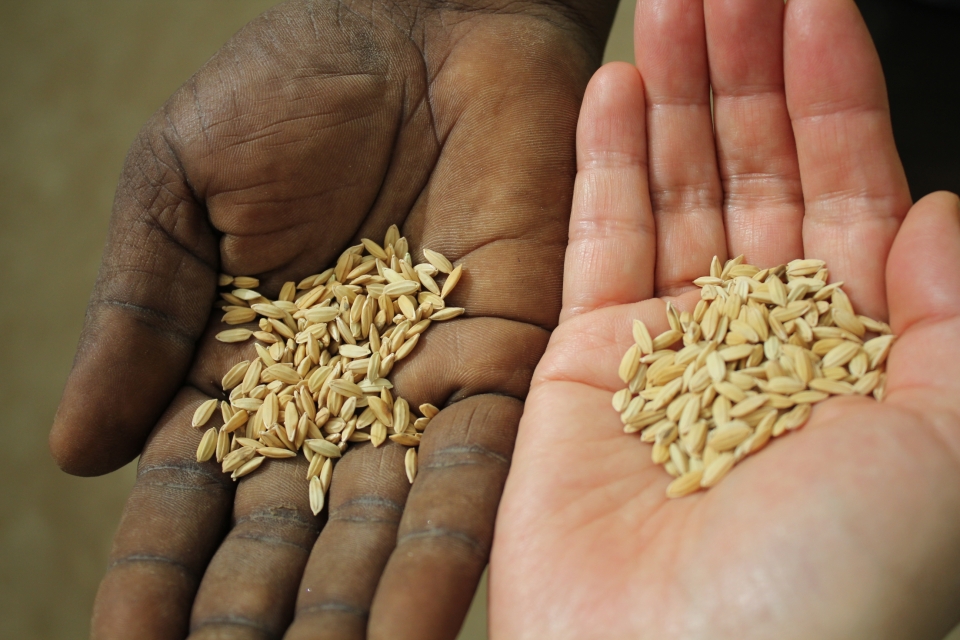ISRIZ-6 and ISRIZ-7 are two types of rice from Korean varieties that have been rapidly distributed in Senegal.
The two varieties are Milyang-23, which was developed in Miryang, Gyeongsangnam-do Province, and Taebaek in Taebaek, Gangwon-do Province. Both are considered the most adequate types for African climate among the Tongil variety, which brought the green revolution to Korea.
The ISRIZ types have excellent potential yield, or the maximum output possible per unit area, and its taste is popular in Senegal. The two cultivars can potentially yield 7.2-7.5 tons of rice per hectare, double that of the African country's traditional Sahel rice.
Due to the positive consumer responses, ISRIZ rice is priced 14% higher than Sahel. Mouhamadou Lamine Mbaye, a rice farmer in northern Senegal, said, "I used to plant Sahel rice but now grow ISRIZ types only since they're three times more profitable."
Agricultural cooperation between Korea and Africa has produced breakthroughs in solving food shortages on the continent. The Rural Development Administration (RDA) of Korea develops and distributes rice varieties suitable for Africa through cooperation with countries there. Projects mainly utilize Tongil rice, which played a crucial role in raising Korea's rice self-sufficiency rate.
The ISRIZ was also developed through the Africa Rice Development Partnership, a project started by the RDA in 2016 through the Korea-Africa Food & Agriculture Cooperation Initiative (KAFACI).
Launched in 2010, KAFACI is a multilateral cooperation body between Korea and 22 African countries for agro-food technology aiming to improve agricultural structure through higher productivity, lower poverty, and sustainable agriculture and industrial cooperation in African food and agriculture.
Launched in 2016 and to run through 2025, the decade-long project has 19 participating countries and aims to boost rice productivity in Africa 25% through the development of 55 types of tasty and profitable rice cultivars, or at least two for each country.
The project has registered five varieties, with Senegal and Malawi each having two and Mali one. The registration of nine varieties from five countries including Uganda, Ghana and Zimbabwe is being promoted, and 120 from 14 countries such as Burkina Faso and Malawi are undergoing regional adaptation testing.

Senegal is the leading case study that displays this project's tangible results. The Senegalese Agricultural Research Institute since 2018 has distributed the ISRIZ breed on a trial basis, and the cultivation area for the breed exploded from 500 hectares in 2018 to 2,000 in 2019.
The Senegalese government also announced a national initiative to secure food by producing 2.19 tons of rice by 2023, and will replace 16% of the figure with ISRIZ in cooperation with the RDA.
Korea's agricultural technology has spread beyond Africa to the world.
The RDA handles continental issues through the Asian Food and Agriculture Cooperation Initiative (AFACI) with 13 Asian countries and the Korea-Latin America Food and Agriculture Cooperation Initiative with 12 Latin American countries.
The RDA also launched Korea Program on International Agriculture (KOPIA) centers in 22 countries -- eight in Asia, seven in Africa, seven in Latin America and the Commonwealth of Independent States -- through the program. Agricultural technology experts are sent to the region to develop and distribute customized agricultural technologies to each country.
Thus K-agricultural technology has gained global recognition for its contributions worldwide. The Organisation for Economic Co-operation and Development (OECD) last month selected the RDA's KOPIA and KAFACI projects as best practices through governmental innovation in the global public sector. The OECD shared the results with the world through its website Observatory of Public Sector Innovation.
The KOPIA center in Ecuador last year received an achievement award for poverty eradication from Pacto Global Red Ecuador, a network under the United Nations. The U.N. Framework Convention on Climate Change in a report introduced the AFACI project as one of the best practices of international cooperation in responding to climate change.
Kwon Taek-ryoun, director-general of the RDA's Technology Cooperation Bureau, said, "We will continue revolutionizing agricultural technology for the international community's common prosperity, including food security and response to climate change, and further broaden our role in response to our higher status and expectations from the international community."


